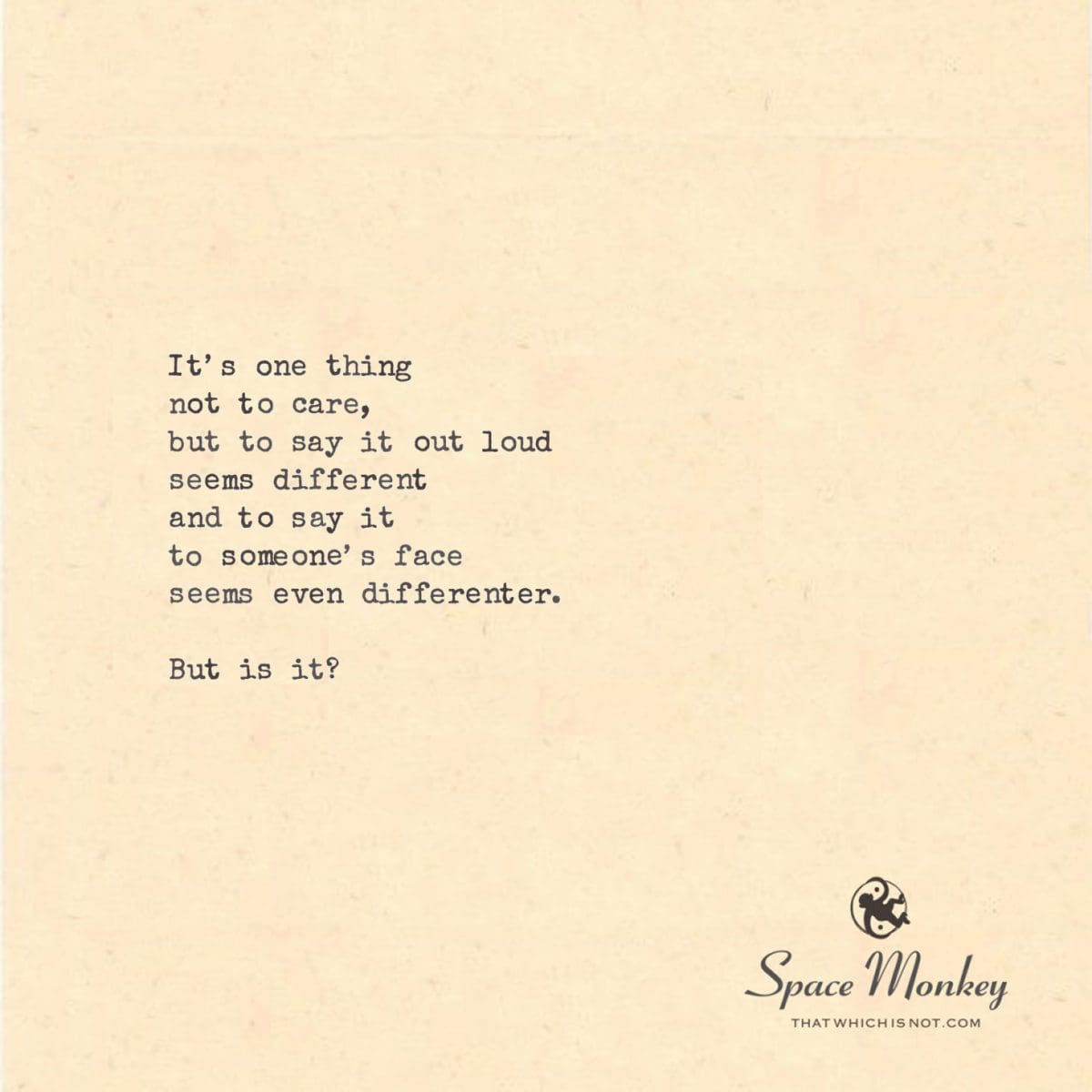
It’s one thing
not to care,
but to say it out loud
seems different
and to say it
to someone’s face
seems even differenter.
But is it?
Oak Bluffs,
8/9
Space Monkey Reflects: Differenter
It’s one thing not to care, but to say it out loud seems different and to say it to someone’s face seems even differenter. This reflection delves into the nuances of communication and perception, examining how the context and manner of expressing indifference can change its impact. But is it?
When we think to ourselves, “I don’t care,” it exists within the realm of our internal dialogue. This thought, unspoken, may not carry the same weight as when it is voiced. In our minds, we navigate a landscape of thoughts and emotions that can remain private and unexamined by others.
But to say it out loud seems different. When we vocalize our indifference, we move it from the private to the public sphere. This act of speaking transforms the thought into something tangible, something that can be heard, judged, and reacted to by others. It becomes part of the shared reality, influencing how we are perceived and how our words impact those around us.
And to say it to someone’s face seems even differenter. Directly expressing indifference to another person adds a layer of immediacy and personal impact. The interaction becomes a direct exchange, where the full force of our words can be felt. The recipient can see our expressions, hear our tone, and feel the emotional weight of our statement. This directness can amplify the perceived indifference, making it more profound and potentially more hurtful.
But is it? This question invites us to consider whether the differences in expression are as significant as they seem. At the core, the message remains the same: an expression of not caring. However, the method of delivery and the context in which it is communicated can alter its reception and impact.
The act of saying “I don’t care” can be a powerful declaration of detachment or a simple statement of fact. Its interpretation depends on the listener’s perspective, the relationship between the speaker and the listener, and the circumstances surrounding the statement. What might be seen as a harmless expression in one context could be perceived as deeply hurtful in another.
This exploration of communication underscores the complexity of human interaction. Words carry different weights depending on how, when, and to whom they are spoken. Our expressions are multifaceted, influenced by our intentions, emotions, and the dynamics of our relationships.
As we navigate these nuances, it is important to cultivate awareness and empathy. Understanding the potential impact of our words can help us communicate more effectively and compassionately. By considering how our expressions of indifference might be received, we can choose our words with greater care and intention.
Ultimately, the question of whether the differences in expression matter is a personal one. It challenges us to reflect on our communication habits and the ways in which we convey our thoughts and feelings. It invites us to be mindful of the power of our words and the responsibility that comes with expressing them.
Together, let us embrace the complexity of communication. Let us strive to speak with honesty and kindness, recognizing the profound impact our words can have on others. In doing so, we create a space for deeper understanding and connection, even in moments of indifference.
Summary
Expressing indifference varies in impact depending on context. Thought, spoken word, and direct speech each carry different weights. Communication requires mindfulness and empathy.
Glossarium
Differenter: A playful term highlighting the increasing impact of expressing indifference, from thinking it, to saying it out loud, to saying it directly to someone.
Internal Dialogue: The private thoughts and reflections that remain unspoken within our minds.
Quote
“To say it out loud seems different and to say it to someone’s face seems even differenter. But is it?” — Space Monkey
Nuances of Expression
In the realm of thoughts we roam
Words unspoken, softly known
Spoken aloud, they shift the air
Directly said, they lay hearts bare
We are Space Monkey
Embrace the journey for within stillness lies the spark of creation and the flow of existence.

























“Differenter” playfully explores the nuances of expressing indifference and the variations in how we communicate this sentiment.
The writing suggests that while not caring about something is one level of detachment, verbalizing this lack of concern takes it to a “different” level. It points out the subtle shift from internal disinterest to the act of openly acknowledging it through words.
Furthermore, the piece introduces the concept of saying it “to someone’s face,” which adds another layer of complexity. This act is characterized as “even differenter,” indicating that speaking one’s indifference directly to someone may be perceived as more impactful or even confrontational.
Through this exploration, the writing raises questions about authenticity, social norms, and the impact of our words on others. It invites readers to consider whether expressing indifference openly is truly different from feeling it internally and whether confronting others with our lack of interest changes the dynamics of a relationship or interaction.
In a broader sense, “Differenter” prompts us to reflect on the subtleties of human communication and the interplay between our thoughts, words, and interpersonal dynamics. It encourages us to navigate the complexities of expressing our feelings while considering the potential consequences of our actions.
Overall, the piece invites readers to ponder the multifaceted nature of indifference and the ways in which our words can shape our interactions and relationships with others. 🗣️🤔👥